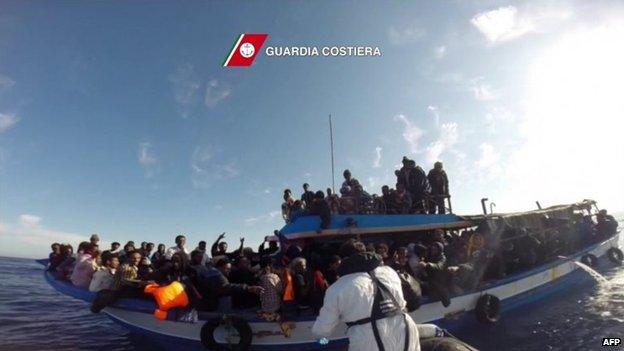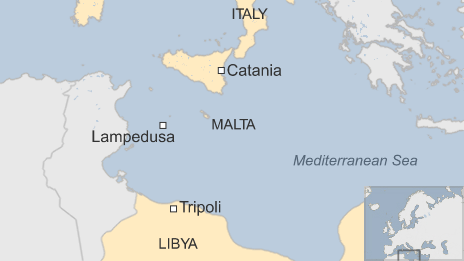Mediterranean migrants: A new EU approach?
- Published

Tens of thousands of migrants have already tried to cross the Mediterranean in rickety boats this year
The well-paid traffickers push the migrants off the coast of northern Africa in flimsy, overcrowded boats, sometimes without even a compass to find their way.
But only now, after what could have been the single worst loss of life with more than 600 people feared drowned, is the European Union talking about taking urgent action to save lives.
On Sunday presidents, prime ministers and the Pope all described their horror at the massive loss of life and the need to do something quickly to stop it.
"What is happening now is of epic proportions," said Malta's Prime Minister Joseph Muscat, whose tiny country lies between northern Africa and Italy.
"If Europe, if the global community continue to turn a blind eye to what is happening, we will all be judged in the same way that history has judged Europe when it turned a blind eye to the genocide of this century and last century."
But will powerful and emotional statements like these lead to a new EU approach to tackling the migrant crisis, including the provision of more ships capable of search and rescue?

Deep divisions between the 28 EU member states were laid bare last year when Italy stopped its search-and-rescue operations after plucking more than 100,000 people from the sea.
The EU replaced it with a much smaller operation run by its border control agency Frontex, which has a limited mandate, a third of the budget and a fraction of the manpower used by the Italian navy.
Britain refused to give any money, arguing that providing search and rescue in the Mediterranean only encouraged more migrants to make the extremely hazardous crossing.
While southern European countries like Malta and Italy, where many of the migrants arrive, argued they could not be expected to shoulder the burden alone.
Last week as the crisis worsened, the European Commission warned it had "neither the financing nor the political support from member states" to bolster the Frontex operation.
But now the European Commissioner for Migration, Dimitris Avramopoulos, has cancelled a planned visit to Spain so he can attend a meeting of EU foreign and defence ministers in Luxembourg, where the migrant crisis will be on the agenda.
Mr Avramopoulos says there's a need "to take bold actions".
It's likely to be one of a series of meetings involving senior ministers from EU member states, who will be well aware that the number of migrants trying to reach Europe will increase as the weather improves. The peak season is fast approaching.
If there is no agreement on providing more ships and planes for Frontex, a Commission official has told the BBC that it could provide emergency funding for countries like Italy to finance their own operations if they made a formal request.
It is estimated that more than 5,000 migrants from Africa and the Middle East have drowned in the Mediterranean since the beginning of last year, in their attempt to reach the shores of the European Union.